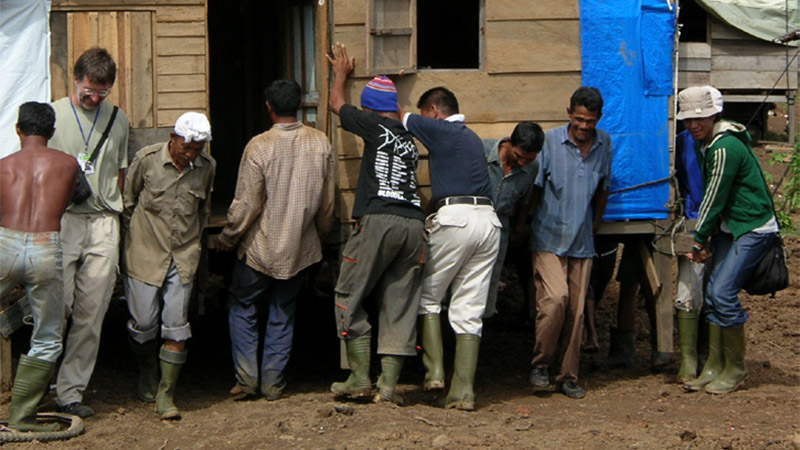Shelter after Disaster
PGCert
Start dates: September 2024 / September 2025
Full time: One semester (four months)
Location: Headington
Department(s): School of Architecture
Overview
Our Shelter after Disaster course provides you with the knowledge to understand and discuss the essential components of shelter response after a disaster.
Safe shelter is a critical need immediately after a natural disaster. This course aims to develop reflective practitioners who can combine:
- understanding of practical strategic issues of development and emergency practice
- an appreciation of the wider political context in which they operate.
You will learn about development and humanitarian practice. AS well as the role of the practitioner intervening in post disaster reconstruction.
We have developed good relationships with agencies working in the shelter field. Occasionally we can offer you internship possibilities within these organisations.
The course is suitable for students with technical as well as non-technical backgrounds. There is no need to have any previous knowledge in building, construction, architecture or engineering.

Course details
Study modules
Please note: As our courses are reviewed regularly as part of our quality assurance framework, the modules you can choose from may vary from those shown here. The structure of the course may also mean some modules are not available to you.
Research
We have an international reputation in research, in areas including:
- sustainable design
- modular buildings
- design for wellbeing
- vernacular architecture.
Staff in the school regularly secure research funding from the UK's research councils and the European Union as well as industry, with an annual research grant income averaging £1,000,000 in recent years.
Careers
A good number of our former students have found work in the shelter sector and we are building an alumni network to help current students get in contact with organisations who work in the shelter sector.
Entry requirements
Specific entry requirements
Applications will normally be open to candidates who fulfil at least one of the following requirements:
- hold an approved undergraduate degree in a relevant discipline
- hold a relevant recognised diploma or professional qualification in a relevant discipline (eg human rights, development practice, humanitarianism, architecture, planning, environmental psychology, public health, geography, public administration)
- hold substantial and proven field experience (in potential replacement of a degree qualification) within a relevant area, eg with an NGO.
Please also see the University's general entry requirements.
English language requirements
If your first language is not English you will require a minimum academic IELTS score of 6.5 overall with 6.0 in all components.
OR
An equivalent English language qualification acceptable to the University.
Please also see the University's standard English language requirements.
Pathways courses for international and EU students
We offer a range of courses to help you meet the entry requirements for your postgraduate course and also familiarise you with university life in the UK.
Take a Pre-Master's course to develop your subject knowledge, study skills and academic language level in preparation for your master's course.
If you need to improve your English language, we offer pre-sessional English language courses to help you meet the English language requirements of your chosen master’s course.
English requirements for visas
If you need a student visa to enter the UK you will need to meet the UK Visas and Immigration minimum language requirements as well as the University's requirements. Find out more about English language requirements.
Credit transfer
Terms and Conditions of Enrolment
When you accept our offer, you agree to the Terms and Conditions of Enrolment. You should therefore read those conditions before accepting the offer.
International qualifications and equivalences
How to apply
Application process
Tuition fees
Questions about fees?
Contact Student Finance on:
Tuition fees
Fees quoted are for the first year only. If you are studying a course that lasts longer than one year, your fees will increase each year.
The following factors will be taken into account by the University when it is setting the annual fees: inflationary measures such as the retail price indices, projected increases in University costs, changes in the level of funding received from Government sources, admissions statistics and access considerations including the availability of student support.
How and when to pay
Tuition fee instalments for the semester are due by the Monday of week 1 of each semester. Students are not liable for full fees for that semester if they leave before week 4. If the leaving date is after week 4, full fees for the semester are payable.
- For information on payment methods please see our Make a Payment page.
- For information about refunds please visit our Refund policy page
Additional costs
Please be aware that some courses will involve some additional costs that are not covered by your fees. Specific additional costs for this course are detailed below.
Optional costs
| Additional costs | Amount (£) |
|---|---|
It’s your responsibility to cover print / binding costs where coursework submission is required. Please note that a lot of the coursework is now submitted online. |
From £30 |
| You may choose to purchase books to support your studies. Many books on our reading lists are available via the Library, or can be purchased secondhand. | £20-60 per book |
Accommodation fees in Brookes Letting (most do not include bills) |
£94-265 per week |
Accommodation fees in university halls (bills included, excluding laundry costs) |
£122-180 per week |
Graduation costs include tickets, gowning and photography. Gowns are not compulsory but typically students do hire robes, starting at £41. |
Typically £0-200 |
Students are responsible for their own travel to and from university for classes. BrookesBus travel is subsidised for full-time undergraduate students that are on a course with a fee of £9,250 or more, or living in an Oxford Brookes hall of residence. There is an administration fee for the production of a BrookesKey. |
From £10 |
Funding your studies
Financial support and scholarships
Featured funding opportunities available for this course.
All financial support and scholarships
Programme changes:
On rare occasions we may need to make changes to our course programmes after they have been
published on the website. For more information, please visit our
changes to programmes page.

